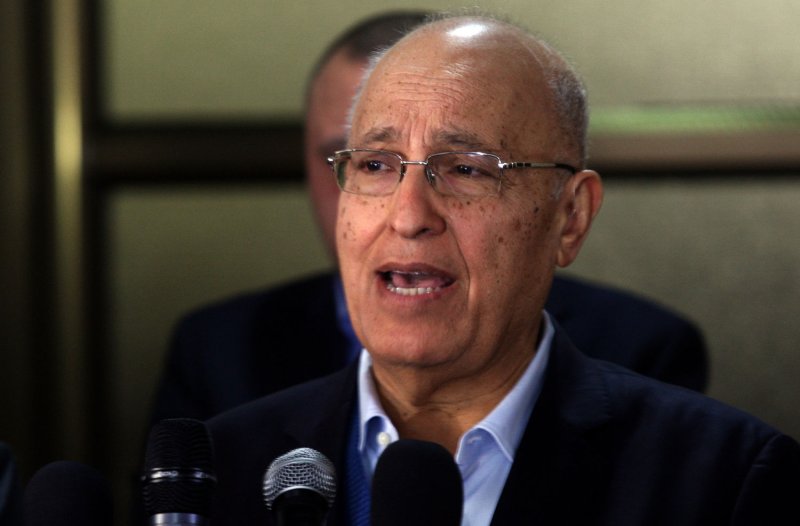Nabil Shaath, international relations commissioner for the ruling Fatah movement in the occupied West Bank, said a consumer boycott should be the Palestinians' weapon against Israel. File Photo by Ismael Mohamad/UPI |
License Photo
CAIRO, Egypt -- The peace process with Israel should be declared dead and Palestinians should wake up from their "peace dreams," former Palestinian chief negotiator Nabil Shaath said in an interview.
"If anything, past experiences and alterations in the world and around us in the region tell us that we should start depending on ourselves, not wait for others to give us our rights," Shaath told The Arab Weekly. "Rights are not given but taken by force."
Shaath, international relations commissioner for the ruling Fatah movement in the occupied West Bank, said he does not mean Palestinians should wage war against Israel. Everyone in the Palestinian territories realizes that heavily armed Israel is far stronger militarily than the Palestinians, he said.
"But still we are far stronger when it comes to public action," Shaath said. "The Palestinians can still defeat Israel, even without arms, tanks and fighter jets."
A consumer boycott should be the Palestinians' weapon against Israel, he said.
The "Arab spring" opened the door to wars in a number of Arab countries and pushed the Palestinian struggle for liberation and statehood into a back seat.
The usual patrons of the Palestinian cause — Egypt, Jordan and the Gulf Arab countries — have been trying to solve their own internal political, security and economic problems.
"Instead of causing us to be sad or weak, this should push us into more unity," Shaath said. "Unity among political factions will make us strong and bring us closer to the fulfillment of the statehood dream."
Among the Palestinians, however, unity seems to be easier said than realized. Over the past few years, numerous factional reconciliation projects ended in vain, sometimes in catastrophe.
The most recent reconciliation project was in 2014 when Fatah and Hamas, the Islamist movement that rules the Gaza Strip, agreed to reunite and hand over administrative control of Gaza to Fatah in preparation for general elections a few months later. The agreement, however, did not bridge differences between the two movements.
The stalemate has given rise to calls inside Fatah for moving ahead in the struggle against Israel and toward statehood without Hamas.
"This is very possible, by the way," said Hazem Abu Shanab, a member of Fatah's Revolutionary Council. "Hamas is about only a fraction of the Palestinian people."
Hamas's absence from any Palestinian unified action would not even weaken the effort, he said.
However, Shaath said he was optimistic about the prospect for reconciliation with Hamas.
"Hamas did not go for reconciliation after 2011 because it did not need it," Shaath said. "The Muslim Brotherhood's rise to power in Egypt and in a number of other countries gave them confidence that they could do without Fatah, but this is changing now with the Brotherhood on the way out of the Arab political scene everywhere."
Although some may disagree with Shaath in his optimism about Hamas, many side with him in that it is time the Palestinians take matters into their own hands.
"The Palestinians have no other choice," said Amr Moussa, a veteran of Arab politics and the former Arab League chief. "The Arab world in its traditional form is over. A new regional system is emerging instead."
Shaath called on his fellow Palestinians to depend on themselves more because his years spent involved in the negotiation process with Israel taught him that the Jewish state would never give the Palestinians their land back freely.
He said the usual brokers, such as the United States, cannot force Israel to make peace with the Palestinians. France, he added, has put forward an initiative to bring the Palestinians and the Israelis to the negotiating table but it cannot realistically put pressure on Israel.
"Israel does not give anything to anybody for free," Shaath said. "It will never give us our land if the cost of occupying this land is not far higher than leaving it."
Shaaath was in Cairo to speak about his new book, My Life from Nakba to Revolution, which documents Shaath's early years, his family and his relationship with Yasser Arafat along with the Palestinian struggle for statehood.
Amr Emam is a Cairo-based journalist. He has contributed to the New York Times, San Francisco Chronicle and the UN news site IRIN. This article originally appeared at The Arab Weekly.















